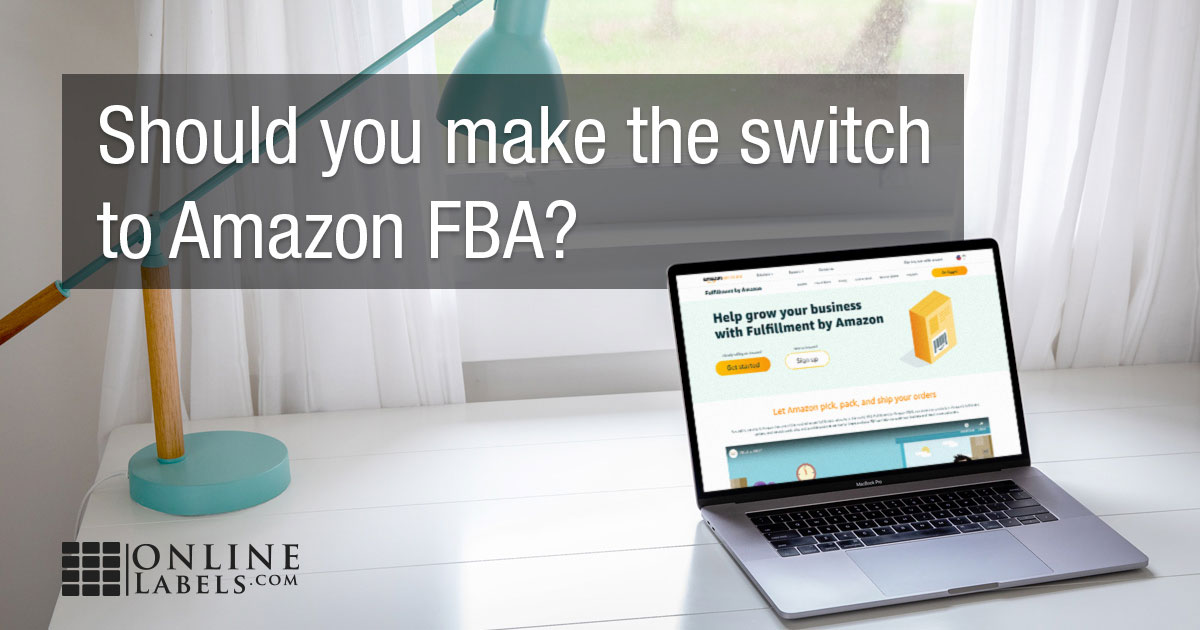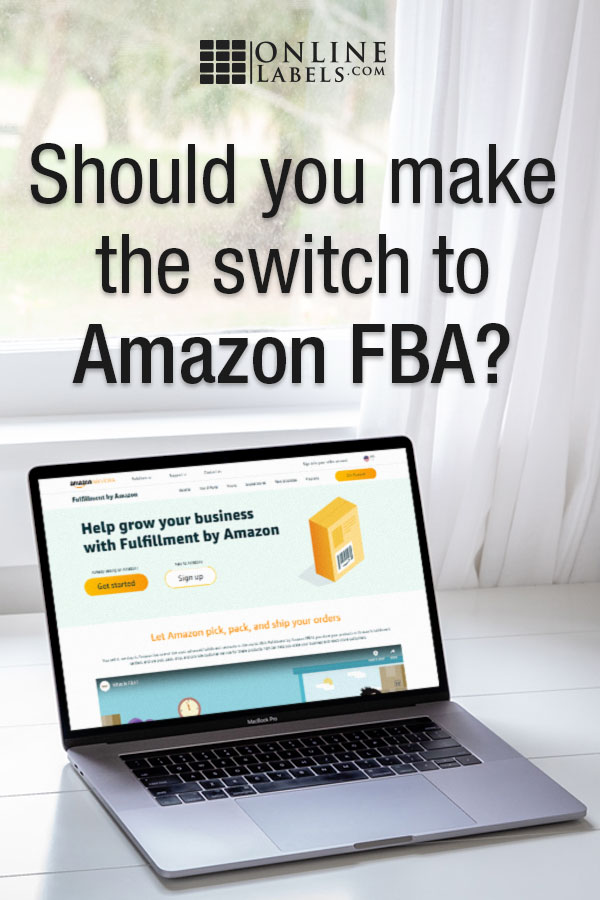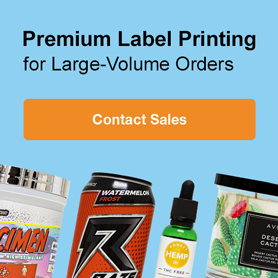Is Fulfillment By Amazon Right For Your Business?

It's easy for anyone to get started selling their products on Amazon. But once you're actively selling on the platform, at what point should you transition to Amazon's fulfillment service?
There are several reasons why you might or might not want to take advantage of this service if you're a seller. Luckily, we're here to help you decide if it's right for you. Below, we dive into the most popular questions and answers when it comes to Amazon FBA.
What is Amazon FBA?
FBA stands for Fulfillment by Amazon. The comprehensive fulfillment service offers to take the stress out of order fulfillment by handling the storage, packaging, and shipping of your orders. This allows businesses to focus more time on the sales and marketing that's needed for a successful storefront.
It's a useful resource for businesses looking to optimize their time and take a step out of the trenches.
How does Amazon FBA work?
You ship your inventory to one of the many Amazon warehouse across the country. As orders come in, Amazon will package your items for shipping and handle the dispatching.
Then, every two weeks, Amazon will deposit your earnings into your bank account.
Who can join Amazon FBA?
When it first started, FBA was only available for Amazon sellers. Today, it can fulfill orders on other website platforms making it an option for all ecommerce businesses.
How much does Amazon FBA cost?
Costs are primarily based on your product's size and weight, though the pricing changes depending on the season. The months leading up to the holidays, for example, are more expensive. Certain product categories may experience surcharges as well, like clothing.
For reference, the storage cost of a standard-size product in December of 2019 is $2.40 per cubic foot but only $0.69 in September. You also have to account for the fulfillment fee, which can range from $2.41 for small items to $4.71 for large items (with an additional $0.38 charge for every pound over the 2 lb mark). Oversize products in both categories carry even more of a financial burden.
View Amazon's FBA fee and rate structure or get specific costs for your product using its FBA calcualtor.
Are Amazon FBA fees tax deductible?
As long as the fees are paid in connection with the sale of a product as part of your trade or business, they should be a deductible expense. Thus, your monthly Amazon FBA subscription fee and applicable storage and inventory fees should be tax deductible as "ordinary and necessary" expenses under code section 162.
What does it take to send a product to Amazon FBA?
Every shipment to FBA must be created in Seller Central, where you catalog exactly what you're sending and how much of it. You'll need to individually label each unit of inventory per Amazon's FBA labeling guidelines (outlined in detail here), package it in your shipping box, download the pre-paid shipping label, and dispatch your products.
Amazon handles everything from there.
How much product should you send to Amazon FBA?
You'll want to be methodical about how much product you send to FBA – only send what you can sell in a reasonable amount of time. You'll save money by avoiding the monthly inventory fees and it will prevent you from incurring any financial penalties (for example, there's a charge for products that sit unsold for more six months).
What are the benefits to Amazon FBA?
Sixty-six percent of the top 10,000 Amazon sellers use FBA, here's why.
Amazon Prime Designaton
Amazon FBA products all recieve the Amazon Prime badge thus opening your brand up the 90 million (and growing) Prime members.
Increased Prominence
Amazon tends to promote from within. For example, FBA sellers are more likely to get the coveted Buy Box over non-FBA sellers.
Convenience
You're handing off arguably one of the hardest parts of running a product-based/ecommerce business, order fulfillment. You won't have to clog up your home office with inventory or pay for warehouse space to hold everything. You won't have to stop what you're doing to package and ship an order every time a customer makes a purchase from you. And you won't need to build your own inventory or order management platform, Seller Central does it for you.
Amazon will also manage payment processing, customer service, shipping issues (lost packages, damaged on arrival, arrived late, etc), and returns/refunds.
Discounted Shipping Rates
In using FBA, you get access to shipping rates well below what's available to the average small business owner. Amazon leveraged its volume for lower per package costs (and even has its own delivery fleet), all of which are available to you.
What are the downsides to Amazon FBA?
Chances are you've already thought about using Amazon's fulfillment service, but something stopped you. Here's five reasons sellers may decide against it.
Branding
If Amazon is shipping your product, it will be placed in an Amazon-branded box. This means you lose any opportunity to send your product in your company's envelopes, poly mailers, or boxes.
If your unboxing experience is quintessential to your brand, this may not be worth it. It would lead to very different experiences for your website or in-store customers versus those who ordered from Amazon.
Marketing
Many sellers relish the opportunity to add packaging inserts to their customer orders. Packaging inserts can be used to prompt product reviews, suggest new/related products, elicit reorders, offer support, and more.
The opportunity to add inserts to your shipping box isn't available to sellers using FBA since Amazon is packaging your product. You can still add it to your retail-ready packaging, though.
Co-Packed Boxes
One of the selling points of Amazon, to consumers, is that it's a one-stop-shop. But for businesses using FBA, that means you're consistently lumped together with other companies and their products.
Does that devalue your products, brand, or message? Evaluate that before diving into the game.
Sales Tax
2019 was a big year for sales tax law changes. A majority of the 50 states started charging sellers sales tax if they had inventory in the state – including inside FBA warehouses.
Amazon doesn't manage this for its sellers, so you're responsibile for collecting sales tax in each state in which you have inventory. This means you also need to have sales tax licenses in those states and remit the tax you've collected.
On top of that, you will also need to handle sales tax exemptions forms which vary from state to state.
Commingling
If you're selling your own handmade goods, this is not an issue that will affect you. But if you're doing retail arbitrage, this could be a serious downside to Amazon FBA. Commingling means that Amazon will group mass-produced products by barcode.
This means your product is lumped together with everyone elses. So you may not get the sale, but it's your product that ships. Or, on the flip side, you may get the sale but it's not your product that ships. This is the version that's problematic.
You probably keep your inventory in good condition (and ensure that it matches the product listing), but other sellers aren't always as reliable. If a customer is unhappy with the product they recieve, their bad review or return comes back on you.
Commingling is helpful for customers because they get the product faster (the goal is to ship the product from the closest possible warehouse), but it comes at a cost – quality assurance.
Are there alternatives to Amazon FBA?
Absolutely! Amazon isn't the first to offer fulfillment services – the business of 3PLs (third party logistics) has been around for decades.
A 3PL is defined as a firm which provides multiple logistics services for use by customers. Preferably, these services are integrated, or "bundled" together by the provider. These firms facilitate the movement of parts and materials from suppliers to manufacturers, and finished products from manufacturers to distributors and retailers. Among the services which they provide are transportation, warehousing, cross-docking, inventory management, packaging, and freight forwarding.
We compiled a list of 3PLs better than Amazon FBA. Within our list (and one by MultiChannel Merchant) are a few recognizable names, outlined below.
DHL
DHL can handle the fulfillment and shipping for your business. It can operate out of multiple warehouses, across international borders, and more to help your business serve its customers.
FedEx Supply Chain
FedEx offers additional services beyond fulfillment and shipping. It can help with warehousing and distribution, reverse logistics, and more from its 100+ facilities in the US and Canada.
Ryder
Ryder specializes in the transportation of goods including distribution and inventory management. It can help drive growth for your business and allow you to focus on the bigger picture.
UPS
UPS has more than 1,000 sites in over 100 countries. It's vast network offers support with distribution, returns, and other fundamental processes to running your business.
Should you join Amazon FBA?
To help you evaluate your options, we asked Steve from Loaded Kings, an Amazon Top 500 Toys & Games Seller and OnlineLabels.com customer, for some advice.
"If you're finding it challenging to deal with customer service issues while also packing orders and managing inventory, FBA will take care of it all. It's a useful service to take advantage of if you don't have the time to answer questions immediately, aren't skilled with handling complaints, or can't ship your product the second an order comes in.
"Of course, every business is different. We found that it didn't actually make sense to outsource our processes to Fulfillment By Amazon until we crossed the 50-70 orders-a-day threshold. But once we did, it opened up our product line to an international market and we've seen a drastic improvement in our sales.
"It's still important to keep in mind that FBA takes a cut of your total sales. If you don't bring in a high amount in terms of revenue, it may not be worth it. If you just want to get rid of some old textbooks or movies, FBA probably isn't the best choice."
In summary, FBA is best for sellers who's primary business is on Amazon. For small-scale entreprenuers, the fees associated with FBA may eat too much into your profits. In that case, the benefits aren't worth it.
Still on the fence? Visit our Amazon FBA forum post for more tips and advice. Or if you're leaning toward FBA, check out our in-depth article on labeling your products for FBA shipments.
Whichever direction you decide is best for your business, you can count on OnlineLabels.com. We offer shipping labels, product labels, SKU/inventory labels, and more to help you get more product out the door.
This article is meant to be used as a guide, not as an authoritative resource. At the time of publication (October 2019), the information mentioned above is compliant with Amazon's protocols. We are not responsible or liable for any actions taken as a result of using the content or resources listed above.
OnlineLabels.com is not affiliated with Amazon. Amazon does not sponsor or endorse any article or products sold by OnlineLabels.com.



